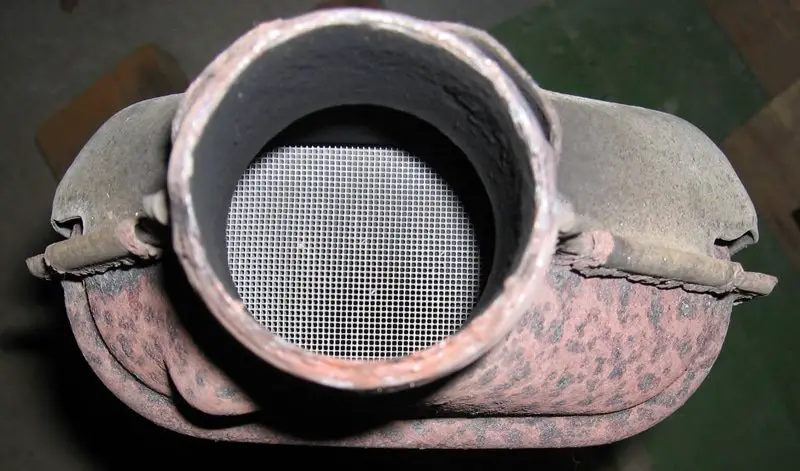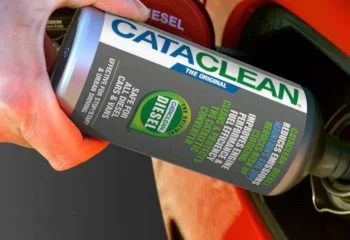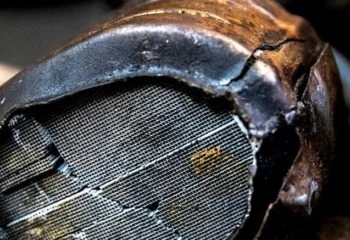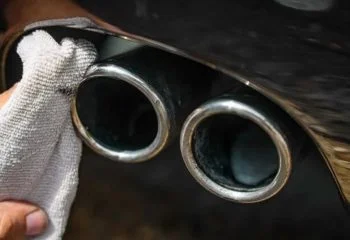If your catalytic converter becomes clogged, it can cause a number of symptoms that may impact your car’s performance.
These symptoms can range from a decrease in fuel economy to an increase in emissions. In some cases, a clogged catalytic converter can also cause your engine to run rough or misfire.
If you’re experiencing any of these symptoms, it’s important to have your catalytic converter checked out.
In this blog post, we’ll discuss the symptoms of clogged catalytic converter, as well as some of the most common causes. We’ll also provide some tips on how to fix a clogged converter yourself, or how to get it serviced if needed. Keep reading for more information!
What's in this post?
What is a catalytic converter and what does it do?
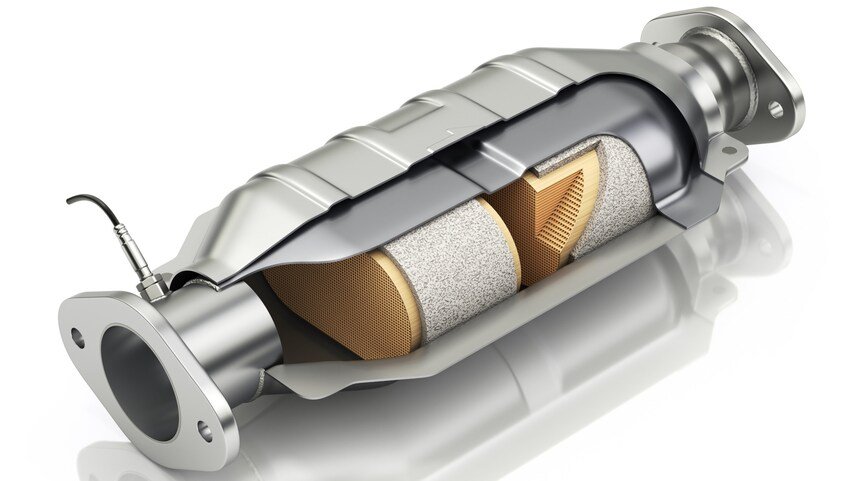
A catalytic converter helps to reduce the harmful emissions from an engine.
The converter contains a catalyst, which is usually made of platinum or palladium. When the engine’s exhaust gases come into contact with the catalyst, they undergo a chemical reaction that breaks down the harmful compounds into harmless ones.
The most common types of compounds that are converted by catalytic converters are carbon monoxide and hydrocarbons.
Additionally, some converters are also designed to remove nitrogen oxides from exhaust gases.
Catalytic converters are an essential part of modern emission control systems, and they have helped to make internal combustion engines much cleaner and more efficient.
What are the symptoms of a clogged catalytic converter?
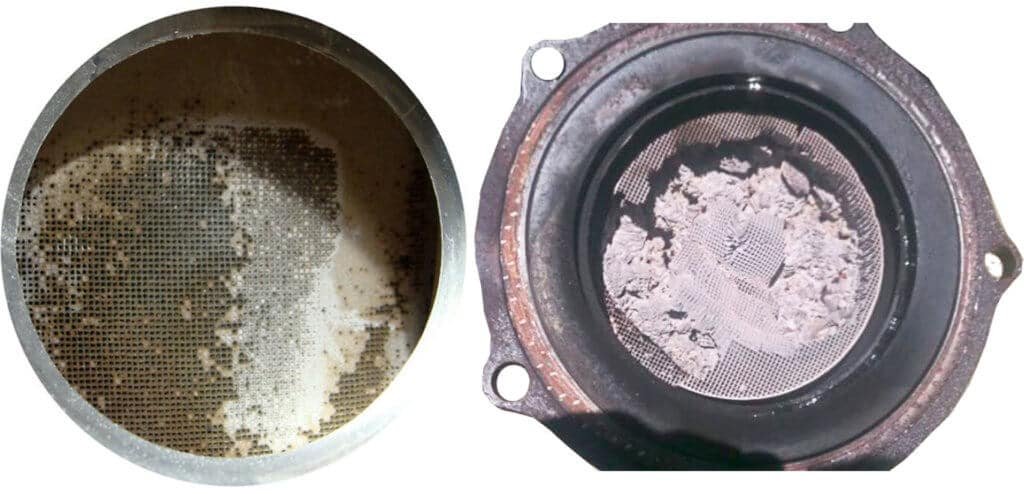
There are a few different symptoms that may indicate that your catalytic converter is becoming clogged.
Some of the most common signs of a clogged converter include:
- Decreased fuel economy
- Increased emissions
- Check engine light is on
- Engine is running rough or misfiring
- Reduced power and acceleration
Decreased fuel economy
A clogged catalytic converter can cause decreased fuel economy for a number of reasons.
First, the converter is responsible for converting harmful emissions from the engine into less harmful emissions.
When the converter is clogged, it is not able to properly convert these emissions, and as a result, more harmful emissions are released into the environment.
Second, the converter helps to improve the efficiency of the engine by helping to convert unburned fuel into usable energy.
This process is less efficient when the converter is clogged, and as a result, the engine consumes more gasoline to deliver the same amount of horsepower.
Finally, the converter can also affect the performance of the engine by restricting airflow. When airflow is restricted, the engine has to work harder to produce power, and as a result, fuel economy is decreased.
Increased emissions
A catalytic converter is an important emission control device in a vehicle’s exhaust system. The purpose of a catalytic converter is to change harmful pollutants in the exhaust gas into less harmful chemicals before they are released.
A catalytic converter can become clogged for a number of reasons, including the use of leaded gasoline, oil leaks, or the accumulation of soot from incomplete combustion. When a converter is clogged, it can no longer effectively convert the pollutants in the exhaust gas.
As a result, the vehicle will emit higher levels of harmful gases, such as carbon monoxide and nitrogen oxides. A clogged CAT can also cause a decrease in fuel economy and an increase in engine noise.
Consequently, it is important to keep your catalytic converter clean and free from blockages to ensure your car is running efficiently and emitting minimal pollution.
Check engine light is on
A CAT can cause the check engine light to come on for several reasons.
First, as mentioned above, a clogged converter can cause increased emissions. The check engine light will come on if the vehicle’s emissions exceed the allowable limit.
Second, the converter can also affect the performance of the engine, and the check engine light may come on if the engine is not running as efficiently as it should be. Finally, the check engine light may also come on if there is a problem with the oxygen sensor.
The oxygen sensor is located in front of the catalytic converter. It measures how much oxygen is in the exhaust gas. If there is too much or too little oxygen, it can cause the check engine light to come on.
Engine is running rough or misfiring
The converter needs a certain amount of exhaust pressure to function properly, and if it’s clogged, that pressure can drop, causing the engine to run rough or misfire.
First, the converter depends on a flow of exhaust gases to function properly. When the converter is clogged, the flow of exhaust gases is restricted, making it less effective at converting pollutants into harmless emissions.
Second, the clogged converter can cause an increase in backpressure. This happens when the gases have nowhere to go but back up through the engine, causing increased strain and reduced efficiency.
Finally, a clogged CAT can make it difficult for the engine to “breathe.” This can lead to a decrease in power and overall performance.
Reduced power and acceleration
A clogged catalytic converter can severely reduce a car’s power and acceleration. This is because the converter needs a certain amount of airflow to function properly.
When it is clogged, the engine has to work harder to push exhaust through the converter, which reduces its power output.
In addition, a clogged converter can cause the engine to run hot, which can lead to serious damage.
If you notice that your car is losing power or accelerating slowly, it may be time to have your catalytic converter checked.
Car smells like rotten eggs
If your car smells like rotten eggs, it could be due to a clogged or damaged catalytic converter. Actually, a strange odor is one of the most visible symptoms of clogged catalytic converter.
The catalytic converter is an essential component of your vehicle’s exhaust system, and it helps to reduce emissions by converting pollutants into less harmful substances. Over time, however, the catalytic converter can become clogged with soot and other debris, which can cause a foul smell to emanate from the exhaust.
In some cases, the catalytic converter can also become damaged, which can lead to even more pronounced odors. If you notice that your car smells like rotten eggs, be sure to have it checked out by a qualified mechanic. Left unchecked, a damaged catalytic converter can seriously impact your vehicle’s performance.
Exhaust leak
A clogged catalytic converter can definitely cause an exhaust leak. When the converter isn’t working properly, it can’t do its job of converting harmful gases into less harmful ones.
These gases build up in the engine and eventually blow out through the exhaust system. If there’s a hole or crack in the exhaust pipe, that’s when you’ll start to hear an exhaust leak. So if you’re smelling exhausted from your exhaust system, it’s definitely worth getting your catalytic converter checked out. Also, don’t hesitate to check more exhaust leak symptoms.
What are the causes of a clogged catalytic converter?
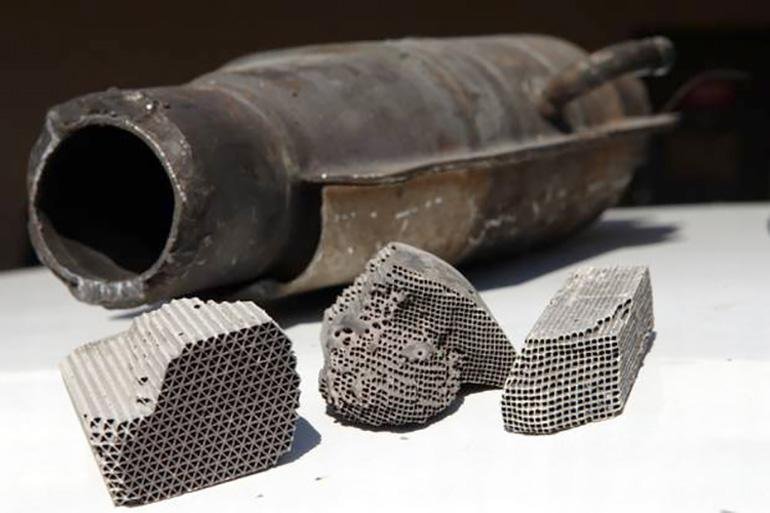
A clogged catalytic converter can cause a number of problems, including exhaust leaks engine performance issues and increased emissions.
There are several things that can cause a catalytic converter to become clogged, including oil sludge, fuel deposits, and exhaust tape.
Over time, these deposits can build up and restrict the flow of exhaust gases through the converter. This can cause the engine to run lean, resulting in decreased performance and increased emissions.
In some cases, a clogged converter can also cause the check engine light to come on. If you think your catalytic converter may be clogged, it’s important to have it inspected by a certified mechanic. Or, you can do it yourself, unclog a catalytic converter is fairly easy in my opinion.
How to diagnose the problem?
One way to tell if your catalytic converter is starting to go bad is by using a vacuum gauge. Attach the gauge to the engine and start the car.
If the needle on the gauge starts to drop, that’s an indication that the converter isn’t functioning properly.
Another way to test for a clogged converter is to check for back pressure.
Start the car and let it idle for a few minutes, then put your hand over the tailpipe. If you feel the pressure building up, that means the converter is starting to get blocked.
If you notice either of these symptoms, it’s important to take your car to a mechanic as soon as possible so they can diagnose the problem and make any necessary repairs.
How to prevent it?
There are a few things you can do to help prevent your catalytic converter from becoming clogged.
1. Make sure you get your car regularly serviced and keep up with the recommended maintenance schedule. This will help to prevent deposits from building up in the engine and exhaust system.
2. Use good quality fuel and oil. Avoid using cheap or low-quality fuels, as they can contain impurities that can deposit on the catalytic converter.
3. Don’t idle your car for long periods of time. This can cause deposits to build up on the converter, eventually leading to a clog.
If you take these precautions, you can help extend the life of your catalytic converter and avoid costly repairs down the road.
When to replace or repair your catalytic converter?

If you notice any of signs above, it’s important to take your car to a mechanic as soon as possible so they can diagnose the problem and make any necessary repairs.
In some cases, the converter can be cleaned or repaired. However, if it is severely damaged, it will need to be replaced.
Replacing a catalytic converter can be expensive, so it’s important to take care of your car and have it serviced on a regular basis.
This will help to prevent problems like this from happening in the first place.
How can you fix a CAT yourself, or have it fixed by a professional mechanic?
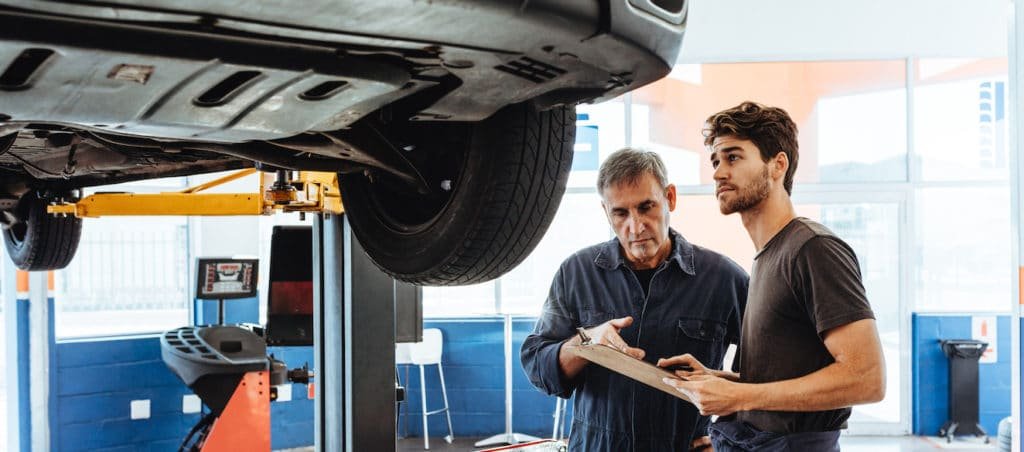
There are a few ways to fix a clogged converter, but it’s important to choose the right method for your car.
One way to clean a clogged converter is to use a chemical cleaner. This method is effective, but it can damage the catalyst if not used correctly.
Another way to clean a clogged converter is to use a catalytic converter carbon cleaning machine to physically remove the deposits. This is a more expensive option, but it’s less likely to damage the converter.
Finally, you can replace the entire catalytic converter. This is the most expensive option, but it will ensure that your car is running properly.
If you’re not sure how to fix a clogged converter, it’s best to consult with a professional mechanic. They will be able to diagnose the problem and recommend the best course of action.
What are other problems a catalytic converter may have?
While a catalytic converter is designed to last the lifetime of a vehicle, there are a number of problems that can cause it to fail prematurely.
One common issue is fence line wear, which occurs when the metal surfaces of the converter come into contact with each other.
This can happen if the converter is installed incorrectly or if the vehicle experiences a major collision.
Additionally, the converter can be damaged by exposure to water, oil, or other fluids.
If the converter becomes damaged, it will need to be replaced in order to ensure that the vehicle is running properly.
Can you clean a catalytic converter?
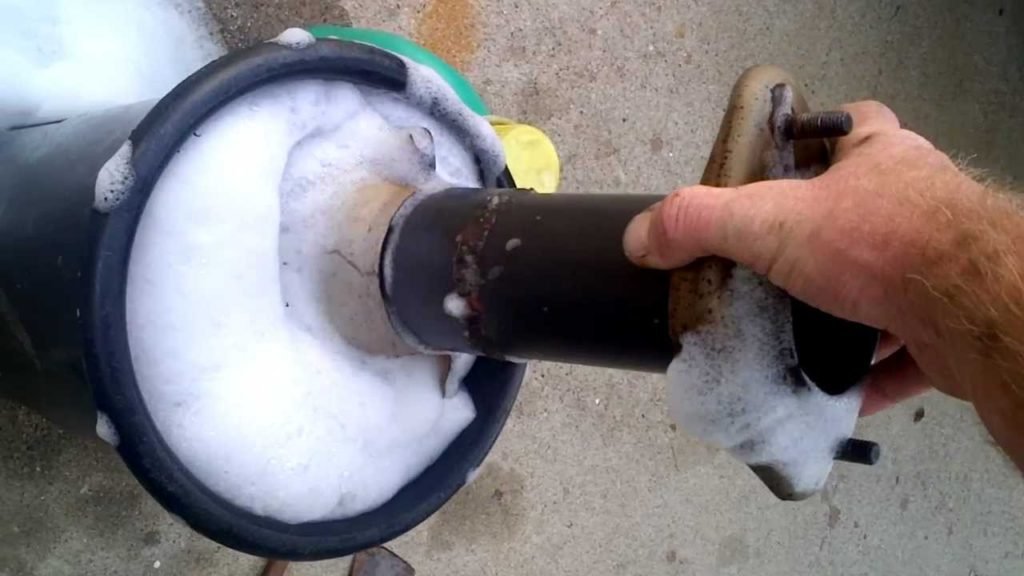
While there are a number of ways to clean a catalytic converter, the most effective method is to use a catalytic converter cleaner.
This type of cleaner will break down the deposits that have built up on the converter, restoring it to its original efficiency.
In order to achieve the best results, it is important to follow the directions of the cleaner carefully.
In most cases, you will need to run the car for a period of time after pouring the cleaner into the gas tank in order to allow it to reach the converter.
See our guide on how to clean a catalytic converter for more information.
FAQs about symptoms of clogged catalytic converter
Can I clean my catalytic converter myself?
Yes. The process is not difficult, but it will take some time. You’ll need to gather a few tools and supplies first, including a funnel, gloves, cleaning solution, and rags.
How often should I have my catalytic converter replaced?
You shouldn’t have to replace your catalytic converter unless it becomes damaged or clogged. In most cases, a simple cleaning will suffice. However, if your converter is more than 10 years old, it may be time to replace it.
What is the life of a catalytic converter?
The average lifespan of a catalytic converter is 10 years. However, this might differ depending on the manufacturer and model of your car, as well as your driving habits.
What are the consequences of driving with a clogged catalytic converter?
If you drive with a clogged catalytic converter, you may notice reduced fuel economy and increased emissions. In some cases, the engine may run rough or stall completely. If left untreated, a clogged converter can eventually cause engine damage.
Can you drive with a clogged catalytic converter?
It is not recommended to drive with a clogged catalytic converter. Doing so can cause reduced fuel economy, increased emissions, and engine damage. If your converter is clogged, it’s best to have it cleaned or replaced as soon as possible.
How do you check a catalytic converter?
There are a few different ways that you can check your catalytic converter to see if it needs to be replaced.
One way is to listen for any strange noises coming from the engine area. A malfunctioning catalytic converter can often cause the engine to run louder than usual.
Another way to tell if the converter needs to be replaced is by looking at the exhaust fumes. If the fumes are darker than usual or there is an unusual amount of smoke, this could be a sign that the converter is not functioning properly.
Finally, you can also take your vehicle to a mechanic and have them run a diagnostic test. This will help to pinpoint any issues with the converter and determine if it needs to be replaced.
Can spark plugs affect catalytic converter?
The catalytic converter is an essential component of a vehicle’s engine, responsible for reducing harmful emissions.
One way it does this is by converting carbon monoxide into carbon dioxide. In order for the converter to function properly, it must be exposed to high temperatures.
This is where spark plugs come in. By igniting the air/fuel mixture in the cylinders, spark plugs help to raise the temperature of the exhaust gas, making it easier for the converter to do its job.
As a result, spark plugs play an important role in the operation of the catalytic converter. If they are worn or damaged, it can affect the converter’s ability to function properly, resulting in increased emissions.
For this reason, it is important to regularly check and replace spark plugs as needed.
Can catalytic converter cause shake?
Yes. One of the most common symptoms of a failing catalytic converter is engine shaking. This is caused by the build-up of pressure in the converter, which makes it harder for exhaust gases to exit the engine.
As a result, the engine has to work harder to push these gases out, which causes it to shake. In some cases, this shaking can be so severe that it causes the engine to stall.
Will a clogged catalytic converter throw a code?
In many cases, it will throw a code for the rear oxygen sensor. This code indicates that the oxygen sensor is not functioning correctly, which can be caused by a variety of factors including a clogged catalytic converter.
Will a clogged catalytic converter cause loss of power?
Yes.Tt can cause a loss of power because it restricts the flow of exhaust gases. This makes it harder for the engine to breathe and can ultimately lead to a reduction in power.
In some cases, this loss of power can be so severe that the vehicle is unable to achieve highway speeds.
Does catalytic converter affect o2 sensor?
One of the gases that the catalytic converter helps to convert is oxygen. As a result, it is possible that the presence of a catalytic converter may cause the oxygen sensor to give a false reading.
However, this is generally not a problem as long as the sensor is properly calibrated. If you suspect that your oxygen sensor is giving a false reading, it is best to consult a qualified mechanic to have it checked and, if necessary, recalibrated.
Can a catalytic converter be tested?
Fortunately, there are a number of ways to test a catalytic converter to ensure that it is functioning correctly.
One common method is to use an exhaust gas analyzer, which measures the levels of pollutants in the exhaust gases.
Another option is to use a sniffer test, which involves inserting a probe into the converter and checking for the presence of certain chemicals.
Is it worth fixing a catalytic converter?
In order to make a sound decision on whether it is worth fixing your catalytic converter, you will want to consult with a professional.
While it may seem like a daunting and expensive task, they will be able to properly assess the situation and provide you with an accurate estimate.
In general, if your catalytic converter is more than 10 years old or showing signs of wear and tear, it may be time for a replacement. However, if it is still relatively new and in good condition, then repairing it may be the better option.
Ultimately, the decision of whether to repair or replace your catalytic converter will come down to a number of factors including the age and condition of the converter, the cost of repairs, and the availability of replacement parts.
By consulting with a professional, you can ensure that you make the best decision for your vehicle.
Can a clogged catalytic converter cause the car to run rich?
A clogged catalytic converter causes your car to run rich, as it is unable to properly convert the exhaust gases into less harmful compounds.
As a result, these gases build up in the engine and are released into the atmosphere, causing air pollution.
In addition to being bad for the environment, running rich can also damage your engine as it runs hotter than usual.
What does a clogged catalytic converter sound like?
A clogged CAT can cause your car to produce a rattling noise. This is because the converter is not able to properly convert the exhaust gases, which causes them to build up and rattle around inside the converter.
In addition, a clogged converter can also cause your car to run rough, have reduced power, and get poor fuel economy.
Can water damage a catalytic converter?
Water can damage a catalytic converter by causing corrosion and rust. In some cases, this can cause the converter to become clogged and cease functioning properly.
If you suspect that your catalytic converter has been damaged by water, it is important to have it checked by a qualified mechanic as soon as possible.
Conclusion
Catalytic converters are an important part of a car’s emissions system, and when they get clogged, it can cause problems with the car.
In this post, we looked at the symptoms of clogged catalytic converter and some possible causes. We also provided some tips on how to fix a clogged catalytic converter.
If you are experiencing any of these symptoms, it is important to take your car in for service right away. Thanks for reading!

